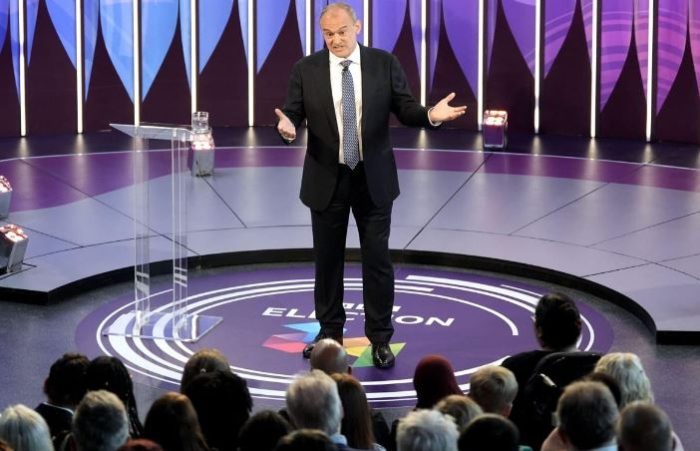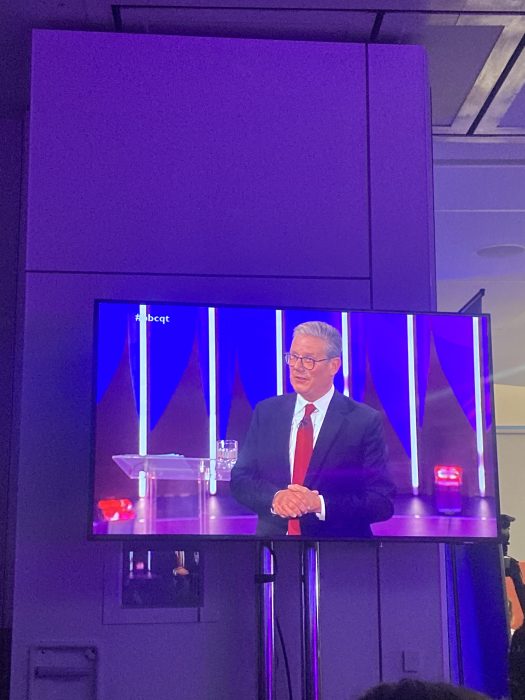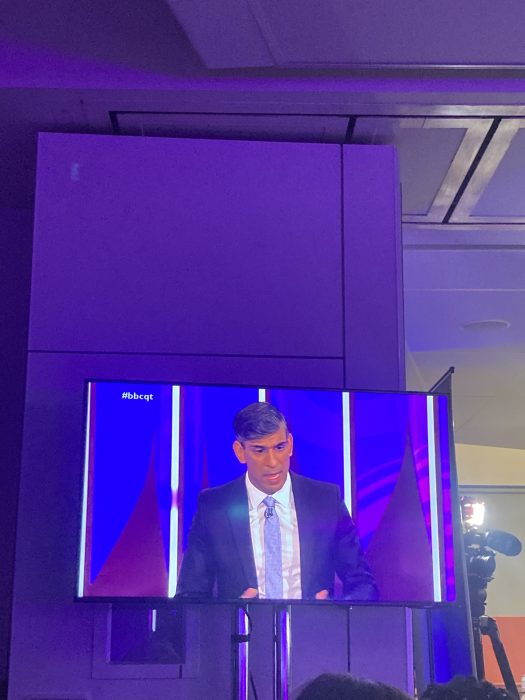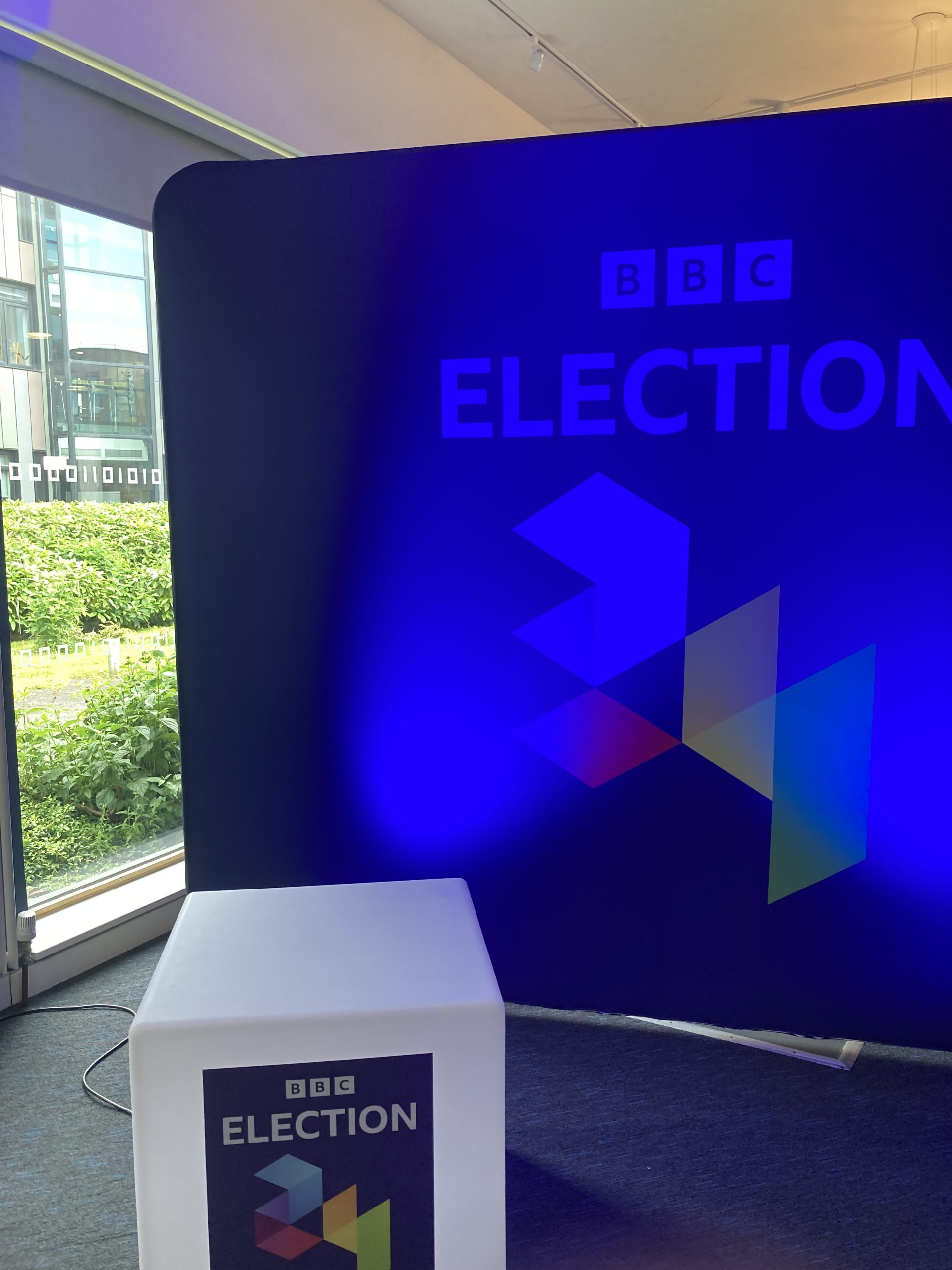Yesterday BBC’s Question Time brought a General Election debate to the University of York campus, with four party leaders taking questions from a live studio audience in the Ron Cooke Hub. As Keir Starmer, Rishi Sunak, Ed Davey and John Swinney gathered to talk about all things current manifestos, future policies and why voters should trust them to lead the country, I set up in the media room in the computer science building, watching the key points whiz past so that you don’t have to!
Each politician had 30 minutes to answer questions from the audience, with host Fiona Bruce occasionally jumping in to ask clarifying points and keep the conversation on track. The debate was smoother than previous leader debates, which often had participants talking over each other, and trying to squeeze answers to complex policy messages into 45 second responses. Most importantly however, this open audience discussion, and smaller, more intimate space (with a noticable lack of lecterns to hide behind), ensured that leaders were able to converse directly with audience members – often leading to some impassioned sparring between public and politician. Seeing the public boldly pressure the leaders of the nation was particularly fascinating, and a vital reminder of democracy at work during this electoral period.

Ed Davey – Liberal Democrats
Liberal Democrat leader Ed Davey kicked off the debate, and was questioned on his campaign techniques, his chances of winning the election, his plans for housing, and whether voters and young people specifically could trust the party after the past scandals of Liberal Democrats.
When asked whether the horseplay that we’ve seen on TV was very prime ministerial, Davey suggested: “We have a well thought through manifesto. I don’t think politicians should take themselves too seriously. When I fell off the paddle board the serious issue was about sewage in our waterways. It’s got to stop.”
Addressing his choice to be photographed going down a water slide, Davey responded: “It was half term, and there were lots of families there… We said there’s a crisis in mental health. That shouldn’t be happening. On the day we came down that slide, we were putting forth a very serious policy.”
“I want to make sure every minute I get like this, and I don’t get many, I put forth Lib Dem values.”
– Ed Davey
Eventually questions turned to the Liberal Democrats’ chance of winning seats in this election, where Davey was particularly clear, “the Election isn’t over.” However, as Fiona prodded: “are you trying to convince people that you can be PM?”. Davey admitted, “it would be challenging given the polls.”
Turning towards the Liberal Democrats controversial history regarding student loans and post election scandals, audience members asked whether voters and young people could “trust you now?”
“I understand why your generation lost faith in us. And we got punished.”
“I would urge people to look at our manifesto, looking at the costing. I don’t want to put the tax up on people.”
The final question came from an audience member wondering what steps the Lib Dems would take to make housing affordable. Davey noted how the current system is funded by borrowing, in an ineffective developer led approach. Housing is close to Davey’s heart, having met his wife through housing policy discussions (a point that receives an “aww” from the crowd, and a “Mister romance” from Fiona Bruce). So he is keen to see a community led approach begin, to fix current infrastructure problems and ensure that “people are happy to have new houses built (in their areas).”
Ultimately Ed Davey’s segment was a useful chance for audiences to hear the more serious side of the Lib Dems so far quite activity focused campaign, which has somewhat usefully used novel water-based appearances to cut through the noise on social media. Concerns about a lack of seriousness or reality seemed to be put to rest here, with Davey admitting a key goal of the appearance was highlighting the new focus of the Lib Dem party: “I want to make sure every minute I get like this, and I don’t get many, I put forth Lib Dem values.”

John Swinney- Scottish National Party
John Swinney’s turn in the hot seat focussed on eradicating child poverty, Scottish Independence, and the disruptive year the SNP has had with internal leadership turnover and controversy.
The audience and Fiona immediately began by questioning the SNP’s internal chaos over the past year, “Where’s it all gone wrong?” Swinney remained optimistic here: “Look, we’ve doubled childcare for families in our country. Full Time early learning. These policies make a real difference.”
“SNP is delivering to individuals – and we’ve got to do more of that to continue changing lives in Scotland.”
Next questions turned to whether the singular party governing Scotland creates complacency, where Swinney highlighted the general swings the party has seen between minority and majority rule over the years, and the need for cooperation. Swinney noted “If I want to get a law passed in the Scottish Parliament, I have to make friends.”
“What’s wrong about our society today is that we’re polarized, we’re not together.”
– John Swinney
One audience member addressed a topical point of debate within Scotland asking “Will you carry on with the Scottish Independence referenda until you get the answer you want? Here Swinney was honest regarding his position claiming “I honestly believe Scotland would be a stronger country if we were independent…I think what politics today needs is self determination.”
Turning finally to the role of the Westminster government in Scotland, one audience member quered “If you were to receive no more funding from Westminster, how will you fix the NHS in Scotland?”
Here Swinney turned the problem back onto the Westminster incumbents: “We need real challenge in the NHS…The problem is the long term effects of 14 years of austerity.” And when asked which Westminster Leader would be best for Scotland (employing from giggles across the crowd), Swinney was quick to note “not the Conservatives“ due to their shambolic position thus far.
Swinney’s position in the debate was a curious choice, given the lack of relevance to the largely English audience of this North Yorkshire debate, and the fact that lead polling parties the Greens and Reform did not receive invites. However, his segment offered a useful chance to get to know this new Scottish leader, and reaffirm the party’s points on key issues of the EU and Scotland’s relationship with England. Given the large role that the leader of Westminster plays in Scotland, hearing the SNPs thoughts on Westminster was particularly interesting for everyone watching.

Keir Starmer – Labour Party
Keir Starmer received a large applause walking into his half hour of the debate, presenting a particularly confident front as he addressed topical points on the NHS, tuition fees, immigration, housing, trans rights and polarisation.
When asked by an NHS staff member how he intends to take pressure off the NHS staff on the ward, Keir highlighted his history with the NHS (with both his mother and sister employed there). “Treat (staff) with respect.” Keir encouraged. “The PM said get the waiting list down, and now he blames you, he blames the staff … .We have to take the pressure off the waiting list.”
This led to a particularly hearty discussion between the would-be PM and the NHS staff member who responded: “But we (the NHS staff) seem to get forgotten about.”
Fiona highlights, “Would you work more hours?”
Staff member “If we got better pay.”
Keir jumped back in: “Yes, let me just deal with this. Every year we have a winter crisis in the NHS. We put a sticking plaster on it, limp through into the summer and nothing gets done. Not fixing it. One of the biggest problems of politics now is politicians not telling us how long it takes to fix things.”
Fiona: “When can people expect to get an appointment?”
“Day one. Operations will get going as quickly as possible.”
“Here I refer to Jo Cox, ‘We have far more in common than what divides us.’ That is what I want to carry.”
– Keir Starmer
Next a student asked whether Starmer would commit to abolitioning university tuition fees, with Starmer responding “Let me address it straight on. We don’t have the money to do everything we need to do. It’s Student fees abolition or waiting list down. I’m not going to do the tuition fees abolition.”
Addressing the Question of immigration Starmer noted there are “Record levels at the moment. need to get it down significantly. But with balance. We need to understand what the problem is. We need a skills strategy.”
And when asked about his previous stance that “only women have a cervix”, Starmer elaborated:
“There’s the biology side, where I referred to Tony Blair ‘Men having Penises, Women having vaginas.’ But then there’s the gender side. Some people don’t identify with the gender of their birth.”
“My view in life is to respect and give dignity to all people. That debate got very toxic. We lost sight of people in that. The Prime Minister of the UK making a trans joke whilst the mother of a murdered trans child watched on. That’s the shocking place we got to.”
Considering a widespread concern that politics has become polarized, Starmer hopes to begin “By bringing the country together.”
“Here I refer to Jo Cox, ‘We have far more in common than what divides us.’ That is what I want to carry.”
And finally, when asked how can people afford to save for a house whilst paying massive amounts of rent, Starmer intends to stop Landlords from ripping off tenants, leading to follow up concerns from Fiona Bruce.
Fiona: How?
“By passing legislation to not allow them.
Fiona: By forcing landlords to take the first offer?
“By stopping rent climbing up and up and up.”
With Starmer’s Labour party racing far ahead in the polls, and the nation staring down the possibility of a super majority for the left leaning party, Starmer’s debate segment gave audiences the chance to hear directly from their future Prime Minister. Starmer was particularly confident and consistent in his answers, and provided many eloquent responses that had both audience members and the watching media nodding with respect. Furthermore, Starmer’s willingness to engage thoughtfully with follow up questions from audience members was particularly refreshing, in comparison to the current PM’s attempts.

Rishi Sunak- Conservative Party
Finishing the night was Rishi Sunak’s turn in what seemed to be the ‘hottest of seats’ in the night. Receiving very little applause as he walked out to face the audience in York (which is a particularly safe Labour seat), the Leader of the Conservatives faced questions about the NHS, migration and the Rwanda Plan.
Beginning with a plea on trust, Sunak noted “My grandparents came here with very little…and within two decades I worked my way up to Prime Minister.
“So I can happily talk to you about many policies, but I am very grateful for what this country has done for my family and I will work very hard to repay that.”
Questioned next on the long NHS waiting list, Sunak was insistent – “It’s coming down.” However Fiona Bruce was quick to comment that “They’ve just gone up again.”
Sunak responded: “Well, Inflation yesterday hit 2%. These things don’t happen overnight. If we stick to it we will get it there. And we did.”
“Waiting lists are starting to come down. During Covid 6 million referrals that would have happened didn’t happen. That we are now catching up.”
When asked about the need for migration, where one particularly passionate audience member noted “Our lazy lot won’t do it.” Sunak highlighted: “In order to fix the problem. We need to do what Australia did. And look into offshore processing.”
Asked to address the timing of the election, Sunak highlighted “Economic stability. I thought that was the right moment to consider our future. You and everyone else has a choice. Do we keep building on that economic stability?”
“What Keir Starmer is promising you, is the same fantasy that Liz Truss promised you.”
– Rishi Sunak
The final questions of the night turned to Sunak’s claims that he would leave the European Court of Human Rights if it clashed with his Rwanda Plan for disincentivizing illegal migrants. Here another impassioned audience member highlighted this strong stance to be “totally devoid of strategic thinking” to which Sunak responded: “15 other EU countries signed a statement on illegal migration. Italy, the Netherlands.”
“I am crystal clear. If a foreign court forces me to choose between national security or membership, I will choose national security every time.”
To this the audience highlighted how the ECHR isn’t a foreign court given that “We were a part of setting up, and it has a British judge” before another audience member announced (with a laugh and a few gasps from the audience and media rooms): “There’s only two countries that don’t subscribe to the ECHR. Russia and Belarus.”
Brief calls of “shame” echoed across the live studio audience as the debate ended, and Sunak’s time in the hot seat, and in Downing Street, seemed to draw to a close. Rishi Sunak’s turn on the Question Time stage was obviously an unpleasant one, marred by floating controversies over Tory bet placing, and a particularly confrontational approach to audience questions.
The comparison between Starmer and Sunak was most evident last night in their back-to-back segments, as the respect for the public, willingness to consider and collaborate on policy discussion and confidence under pressure was put to the test.
And ultimately, this hints at the largest takeaways from the night: a renewed insight into our leaders, the hopes and trust levels of the public (or at least this small segment of the North Yorkshire public), and yes, the increasingly more evident levels of optimism and defeat each politician is feeling a mere fortnight from election day.
